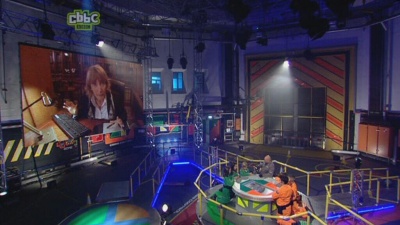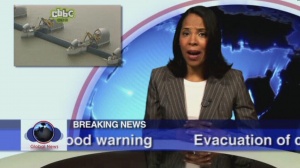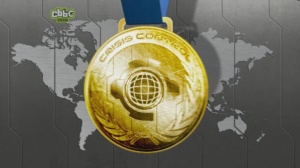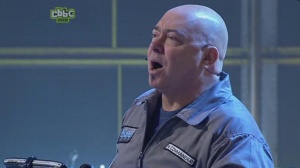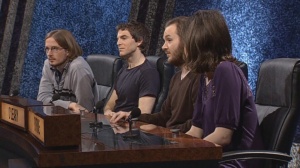Weaver's Week 2009-02-22
Last week | Weaver's Week Index | Next week
Coming up this week, we've the second University Challenge semi-final, two women on Mastermind, and the most unsubtle thing to grace the Eurovision stage this year. This could be an international incident, so let's call up the experts.
Contents |
Crisis Control
CBBC, 4.30 Fridays
Back in 2004, we rather enjoyed sniggering at people trying – and failing – to handle a crisis. Various episodes of The Bunker: Crisis Command – Could You Ruin The Country? ended up with a jet plane flying into the House of Commons, a plague devastating the city of Liverpool, and large parts of Essex being put under several feet of water. The show sorted out those who would take sensible decisions in a crisis, and those who would just get it wrong. Crisis Command – Could You Ruin The Country had a short and troubled life, and not just because it starred Amanda Platell. A pilot in February was criticised for being "too realistic", a six-part series in the autumn was truncated partway through, and one final episode crept out in 2005 under an even shorter name.
Fast forward to the present day, and the childrens' department has – quite correctly – reached the conclusion that this could be an educational idea. What better way is there to teach children about the difficult job faced by grown-ups in a pickle than to get them to sort it out? Adults don't know where to send the army following an earthquake? Ask the children. Such is the conceit of CBBC's Crisis Control, in which children call the shots in an emergency situation.
Each show follows a similar track: after the inevitable introductions, teams of three have a couple of prioritisation tasks. Returning to the earthquake simulation, while one side mobilised the army, the other side worked to deploy the city police to greatest effect. All the evidence is there for the controllers to use – young and fit cadets are able to tackle heavy lifting, older officers know the ground well and should scout less badly-hit areas. Evidence for the various options is presented by an off-screen narrator.
There's always a second, more complex, task in the same scenario. The earthquake example had the teams working out which deserving causes should receive emergency power and water supplies. The game concludes with a physical task, one that takes place in the stricken location. That all these locations look like a BBC-issue car-park, complete with "Keep Out!" cones, is neither here nor there.
So far as we were concerned, one of the great strengths of the mainstream Crisis Command was its hyper-realism. By using real newsreaders, real experts, real guidance, and real egos, it wasn't so easy to suspend our disbelief and remember that this is only an interactive fiction. With the best will in the world, we can't pretend that CBBC's Crisis Control is so close to reality; the decisions are ones that even the youngest and most eager police cadet could take well.
A clear divide between fiction and reality is needed; some viewers of Crisis Command came to the show part-way through, got thoroughly confused, and thought the editions were real news bulletins. Crisis Control very neatly avoids this problem by inventing its own global news channel, Global News, and having the same actors pop up every couple of weeks.
Crisis Command never accepted its destiny to be a game show, it had a bizarre notion that game shows require there to be a clear winner and a clear loser. We disagree: game shows require something that can reasonably be called a victory condition (for instance, containing the plague with minimal loss of life) or a defeat condition (for instance, the kerosene-sodden smoldering ruins of Westminster.) It's not necessary for both conditions to exist. There's no such subtlety for the children's Crisis Control, where each correct decision is rewarded with stars, and the team with the more stars wins the top prize, the Gold Emblem. It's represented by a medal around the members' neck.
As well as its reality, Crisis Command excelled because it recognised there were right and wrong decisions, but there were far more shades of grey, and least-worst choices. Crisis Control is far more blunt: choices are either right or wrong, it's a black-and-white world for the commander and his crew. Some of the decisions the children are asked to make, particularly when they're putting six or eight things in order, would be open for debate amongst the adults, but Crisis Control neither acknowledges shades of grey nor explains its reasoning.
That, to be honest, is the one major criticism we have for the show. Garry Robson is a fine piece of casting as The Commander, able to project leadership to his young cadets. If Sam and Mark want tips in finding a superhero, there's a good candidate.
We should note that Mr. Robson plays his role from a wheelchair. This fact is never mentioned on the show, and the set design flows around the restrictions on his mobility. It's not the first time we've seen someone who is clearly disabled on children's television recently – one competitor played an episode of Hot Rods from a wheelchair, and a warrior on the most recent series of Raven had a hearing impairment. Their disabilities didn't affect their performance on the show, and went unremarked on the broadcasts. Is it still the received wisdom that children will see the person and not the disability, and it's only old fogies (like this column) who fret over things like wheelchairs?
In summary, we appreciate Crisis Control as a worthwhile and interesting diversion. Perhaps we would have liked it even more if we hadn't so loved Crisis Command a few years back.
University Challenge
Semi-final 2: Corpus Christi Oxford v St John's Cambridge
Eyes down, here we go. St John's has come through the repechage, notching up two enormous victories. Corpus Christi Oxford has had three massive wins, their most recent "less like a general knowledge contest, more like a cull," according to the host's scriptwriter.
The opening question is on the couples in Pride and Prejudice, and – picking up where we left off three weeks ago – it's answered by Gail Trimble. Correctly. Never mind, there's always the next question, on silver. It's answered by Gail Trimble. Correctly. Is anyone seeing a pattern here? Shall we make yet another crossing out in our incredibly blotchy University Challenge Book of Records? Maybe not: Thumper is perhaps a little generous to give St John's their first starter, on the new design of the silver and bronze coins. The first visual round is on Latin quotations, and the starter asks who wrote them. It's Horace, and Corpus Christi leads by 80-15.
This game is still alive, but – after Miss Trimble picks up her fourth starter in seven minutes – it is beginning to look rather peaky. Thumper doesn't even bother to tell her that her next starter is correct, just a glance suffices to tell us what we all know. St John's have a particle physicist on their team, and gets the starter about particle physics. Good-oh! Graeme Hick is the subject of the next starter, it also goes to the Cambridge side, and there's just a scent that they might, just, perhaps, possibly make something of this show. The audio round is on 19th century nationalistic tunes, and from a hundred-point lead, Corpus Christi finds their lead has tumbled to 130-65.
Another good interruption has St John's answering meta-questions about the prefix meta-. They could hardly have answered meta- better. Though there's a missignal from Oxford on the next starter, we're a little surprised that the Cambridge side didn't know in which decade Queen Victoria took the throne. Corpus Christi restore normal service in the next starter, though their knowledge of currencies of the former Soviet Union is less than perfect. We'll take Hidden Play of the Week:
- Q: Described as a Greek soldier by Homer, and as a slave by Shakespeare in "Troilus & Cressida", Thersites gives his name to...
- Corpus Christi, Trimble: (shrugs shoulders, clasps hands) Rudeness.
It's the right answer. Had she got this wrong so soon after a missignal, it could have really affected her confidence, and we'd have had a much closer game. St John's bring up the century, and ensure everyone's got a starter correct – in the quarters- and semi-finals, only two losing sides have made 100 points, and only one shared their starters so. Corpus Christi get the visual bonuses, on famous prisoners and their jails, and leads 180-105.
The starter in this picture round was Oscar Wilde and Reading Gaol, and Orna Mulcahy let fly in the Irish Times later in the week. She asserted, "The fact that not one of the three could identify Oscar Wilde in the picture round was as much a blow to our international reputation as anything going on in the banks." This is entirely unfair: the question asked for the prison, Gail Trimble is untouchable on literary questions, and viewers see the pictures a second or so before the contestants so that we might answer before the likes of Miss Trimble can buzz in.
Here's where it pays to have watched Only Connect: the four-crop rotation cropped up in the What's Fourth round, and it turnips here. Knowledge of types of ducks restores the 100-point lead, with four-and-a-half minutes to play. Two starters will win it for the Oxonians, but St John's get the first starter, and two of the bonuses. Corpus Christi get the next starter, and it's do or die for Cambridge. The next starter is dropped, but St John's go for perfection on the calendar and verse. The comeback is still on, not that Thumper is going at any pace.
"Isotropes", says O'Leary. "Isomorphs", buzzes Trimble. She's right, she's always right, and Corpus Christi has won the game. The Oxford side doesn't slow down even when the game's in the bag, and wins by 260-150.
For St John's, the star performer in the second and final defeat was Matthew Dolan, with four starters, his side recovered from a shaky start to get 16/24 bonuses correct with two missignals. Gail Trimble only had 12 starters (TWELVE, as they say in teleprinter land); the side 25/41 bonuses and one missignal.
We read in The Independent this week that Manchester versus Corpus Christi Oxford would be like Federer against Nadal. We'll get the strawberries and cream in for 8pm next Monday night. It's going to be a fantastic game.
Next match: Manchester v Corpus Christi Oxford
Mastermind
Heat 18
Ann South will tackle the History of Chester Zoo. It's a zoo in Chester. Obviously. Some of the questions appear to require fairly long answers, but none of them mentions the city's former MP, for which we can all be thankful. The final score: 9 (4).
Christopher Boote takes on the "Father Brown" stories of G K Chesterton. They're a series of books ... oh, you get the drill. We've mentioned this in the past, but many series of questions go straight to the minutiae of the subject, without setting it in any sort of context for the uninitiated viewer. Distracting for us, and the contender reaches 12 (4).
Hugh Brady does the Life and Times of Edward Carson. The first two questions set the scene, the subject was Irish and a politician, active in the years to 1922. He was also a lawyer, as we later find out. The contender seems thrown by one wrong answer leading to another, but ends on a good 13 (1).
Caroline Fitzsimons welcomes us to Tony Hancock and Hancock's Half Hour. We'll put the contender not remembering "Coughs and sneezes spread diseases" down to nerves, and she ends on 7 (5).
So, what was Mr. Smallhead's favourite episode of HHH? The one with himself and eleven other angry men? We'll never know, because he talks about Caroline Fitzsimons's job as a district nurse. It's one step forward, one step back during the general knowledge questions, and the round concludes at 17 (8).
Chester Zoo, we're told, is a zoo without bars. The animals hide in the long grass, and – given the weather in Chester – make sure they always apply lots of sunscreen. Ann South remembers the original Sorcerer's Apprentice was Mickey Mouse, followed some years later by The Hatted Dragon. A few other lucky guesses – including the Cardiff Singer of the World – takes her to 19 (8).
Mr. Boote finds that both Chesterton and Father Brown were convincing characters – a priest will surely be able to get insight into the nature of sin, by hearing so many criminals confess. The round starts strongly, finishes strongly, though with a hole in the middle. 21 (8) is the target.
Mr. Grady tells us about Edward Carson's other talents, including his cross-examination of Oscar Wilde that ended up with the latter going to Reading Gaol, and Christ Church Oxford scoring their starter question. It all comes round in the end. The win is almost inevitable, achieved in a quiet fashion, and ending on 24 (5).
This Week And Next
We're interested to hear from The Stage that the BBC's to make a pilot show for Saturday night television. Totally Saturday will (almost inevitably) star Graham Norton, and the blurb goes on about "multi-strand Saturday night entertainment and variety show involving the public" and "real people doing extraordinary things". The pilot won't be broadcast.
Over at Monkey Towers, the head of global content has said that ITV needs to make more global hits. According to Lee Bartlett, there's a myth that ITV can make good programmes, or it can make a lot of money. That's an open goal for cheap cracks, like "ITV is currently failing at both." Unfair. Unfortunately, Mr. Bartlett also believes that ITV has to comply with too many regulations, in spite of the way ITV has had its burden eased in every possible way over the past couple of decades, and it is clear that this has not been to the benefit of the public. Most egregiously, Mr. Bartlett would happily do away with the separation between editorial and advertising, and we cannot possibly agree with that mix.
Eurovision news, and we caught a moment of Georgia's entry on one of the news channels. It's a very thinly-disguised dig at Russian power-broker Vladimir Putin. The lyric is performed while making little shooting gestures, and goes, "We don't wanna put in". We're laughing all the way to our plate of chips 'n' cheese curd.
Viewing figures for the week to 8 February are in, and most shows have done very well indeed. The exception: Dancing on Ice, down at 9.45m. In It to Win It and Total Wipeout recorded season best figures (7.8m and 6.8m, respectively), and Masterchef pushed 4.7m to the final. Monday was a snow day in many of the most populous parts of the UK, with schools and workplaces closed. University Challenge finished just shy of 4m, Deal and Come Dine With Me had their best figures of the year, just below 3m. Eggheads entertained 2.5m, and Wogan's Perfect Recall attracted 2.15m.
On the digital tier, congratulations to Come Dine With Me, which has finally racked up a seven-figure audience on More4. 1,063,000 tuned in at 6.20 on 8 February, and a further 96,000 caught the repeat on More5. Pop Idle US fell away to 665,000, and it's being caught by Dave's QI (545,000) and Cbeebies' Kerwhizz (520,000). Blast Lab on CBBC had 305,000 viewers, which proves something.
Coming up next week: the final of Masterchef (BBC2, 8pm Thursday), a celebrity edition of Britain's Best Dish (ITV, 5pm weekdays) and a new run of Celebrity Juice (ITV2, 10pm Wednesdays). Challenge picks up on Postcode Challenge (2pm weekdays), but – as we mentioned earlier – it's the University Challenge final. Centre court tickets for 8pm on Monday.
To have Weaver's Week emailed to you on publication day, receive our exclusive TV roundup of the game shows in the week ahead, and chat to other ukgameshows.com readers sign up to our Yahoo! Group.


